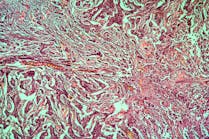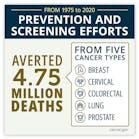A clinical trial led by the National Cancer Institute (NCI), part of the National Institutes of Health, has resulted in the approval of a treatment for advanced alveolar soft part sarcoma (ASPS). The immunotherapy drug atezolizumab (Tecentriq) was recently approved by the U.S. Food and Drug Administration (FDA) for the treatment of adults and children 2 years and older with ASPS that has spread to other parts of the body or cannot be removed by surgery.
ASPS is an extremely rare cancer that affects mostly adolescents and young adults. The approval was based on data from a non-randomized phase 2 trial (NCT03141684) funded by NCI and led by Dr. Alice Chen, M.D., of the Developmental Therapeutics Clinic in NCI’s Division of Cancer Treatment and Diagnosis (DCTD). Genentech, a member of the Roche Group and the manufacturer of atezolizumab, provided the drug to NCI through a cooperative research and development agreement. The results of the study are being prepared for publication.
Atezolizumab is an anti-PD-L1 immune checkpoint inhibitor that works by helping the immune system respond more strongly to cancer. FDA has approved atezolizumab for the treatment of patients with several cancer types, including liver cancer, melanoma, and lung cancer.
The phase 2 trial enrolled 49 ethnically diverse patients ages 2 and older with metastatic ASPS, who were given an infusion of atezolizumab every 21 days. About a third of the patients responded to the treatment with some degree of tumor shrinkage, according to their doctor’s assessment. Most of the other patients experienced stable disease.
After two years of treatment, patients were given the opportunity to stop treatment and go on a treatment break for up to two years with close monitoring. None of the patients who took a treatment break had disease progression during that time.
Serious side effects occurred in 41% of patients receiving atezolizumab; these included anemia, diarrhea, rash, dizziness, hyperglycemia, and pain in the extremities. However, no patients came off the study because of side effects.





